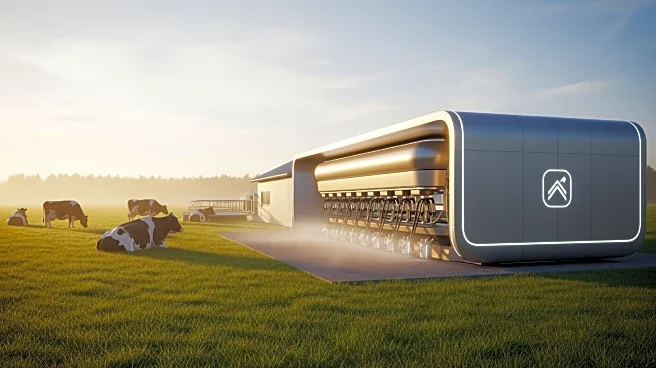What's Happening?
A new concept for dairy farming, termed the 'dairy barn of the future,' is being developed by a national research consortium including Neubrandenburg University of Applied Sciences and the Friedrich Loeffler
Institute. This model emphasizes animal welfare by allowing cows and calves to remain together in stable family herds, providing them autonomy to move freely between barn, pasture, and paddock. The barn integrates automation and sensor technology to reduce employee workload and enhance animal care. A visitor corridor is included for safe observation of barn life, supporting transparency and research without disrupting the animals. The project aims to merge practical operations with advanced data collection, fostering animal welfare and efficient farming practices.
Why It's Important?
The development of the 'dairy barn of the future' represents a significant shift towards sustainable and ethical farming practices. By prioritizing animal welfare and integrating smart technologies, this model could set new standards for the dairy industry, potentially influencing global agricultural policies. The approach not only aims to improve the quality of life for farm animals but also seeks to enhance operational efficiency and transparency in farming. This could lead to increased consumer trust and demand for ethically produced dairy products, impacting market dynamics and encouraging other farms to adopt similar practices.
What's Next?
The project team is seeking partners from various sectors to transition from digital simulation to real-world implementation. The planned demonstration and research barn will facilitate long-term studies on animal health, behavior, emissions, and work organization. This initiative could pave the way for measurable progress in animal welfare and sustainable agriculture. The team is exploring alternative funding options after federal funding was canceled, aiming to realize the barn as a real-world laboratory.
Beyond the Headlines
The 'dairy barn of the future' could influence broader cultural and ethical discussions about animal rights and sustainable farming. By demonstrating the feasibility of combining animal welfare with modern agricultural practices, the project may inspire legislative changes and public advocacy for improved farming standards. This could lead to a shift in consumer preferences towards products that are produced with higher ethical standards.

